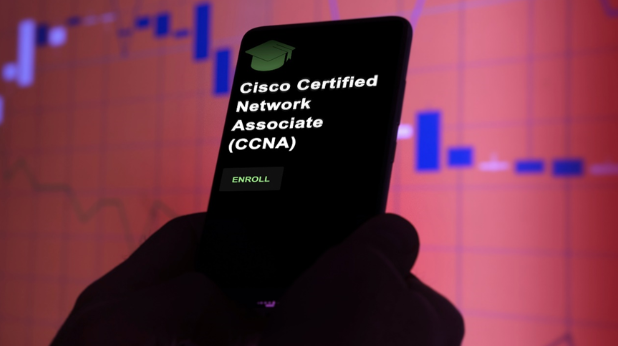When beginning a career in IT, knowing which certifications and skills to add to your resume can be daunting. It can be challenging to anticipate the expectations of future employees and view things from their perspective.
The good news is that although the tech industry can be unpredictable, certain industry standards provide potential employees with a competitive edge when entering a new career in information technology.
One of the most sought-after industry standards is the Cisco certifications. While they are not technically mandatory, Cisco certifications offer a comprehensive training program that equips candidates with the skills and knowledge they need to be job-ready by the time they graduate. In this article, we delve into the importance of Cisco certifications and how they can boost your career by helping you prepare to enter the IT workforce with confidence and competence.
What Are Cisco Certifications?

Cisco Systems is a multinational technology company specializing in developing networking hardware and software – especially cybersecurity, IT, and hardware. The company offers a wide range of certifications at different levels, from entry-level to expert, covering a broad range of IT specializations, including network engineering, cybersecurity, collaboration, data center, and more. These help IT professionals gain knowledge and expertise in Cisco technologies and are designed to simplify the experience of using Cisco Systems for industry professionals. Entrusted by many employers throughout the tech industry, the certifications offer theoretical and practical training, preparing candidates for real-world scenarios.
Comparing Various Cisco Certifications and Which Cisco Certification You Need
Cisco offers a comprehensive range of training and certification programs that validate expertise in different areas of networking technology. These include Entry, Associate, Professional, Expert, and Architect. Each of these tiers is further broken down into individual certifications that allow you to qualify and move on to a more advanced step.
Here’s a brief overview of each level:
Cisco Entry
These certifications are designed for individuals new to the networking industry or who have limited experience. There are two certifications at this level – the Cisco Certified Entry Networking Technician (CCENT) certification and the Cisco Certified Technician (CCT).
CCENT stands for Cisco Certified Entry Networking Technician. It validates an individual’s knowledge of basic networking concepts and support jobs, such as network protocols, IP addressing, and routing. The CCENT certification is a good starting point for individuals who are interested in pursuing a career in networking, as it provides a solid foundation for more advanced certifications.
CCT stands for Cisco Certified Technician. Those who complete this certification are qualified to replace, repair, diagnose, and restore Cisco-related devices and networks.
However, only the CCT certification is currently available, as the Cisco Certified Entry Networking Technician (CCENT) certification has been retired by Cisco, making it no longer available to new candidates.
Pros:
- Entry-level certifications can help beginners gain a foothold in the IT industry and demonstrate their commitment to learning and growth.
- These certifications are relatively easy to obtain and require only passing one exam.
- They provide a foundation of knowledge that can be built upon as IT professionals advance their careers.
Cons:
- The entry-level certifications are not as prestigious as the more advanced certifications. They may not be sufficient for more advanced IT roles or hold much value for experienced IT professionals.
- The knowledge gained from the entry-level certifications may not be enough to secure a high-paying job.

Cisco Associate
The associate-level certifications are for individuals with a basic understanding of networking concepts and who are looking to advance their skills. Considered the next tier up from Entry, Cisco Associate offers many certifications, but they all fall into two categories: CCDA and CCNA.
CCDA stands for Cisco Certified Design Associate. It confirms the skills needed to work in network design.
CCNA stands for Cisco Certified Network Associate. The CCNA certification training covers network installation, troubleshooting, and operations. It validates an individual’s knowledge of advanced networking concepts, such as LAN and WAN technologies, network security, and wireless networking. The CCNA category can be narrowed down and further divided into several categories and individual exams, including:
- CCNA Cloud
- CCNA Cyber Ops
- CCNA Data Center
- CCNA Industrial
- CCNA Security
- CCNA Service Provider
- CCNA Wireless
- CCNA Collaboration
- CCNA Routing & Switching
Pros:
- The CCNA certificate is widely recognized in the industry and can lead to higher-paying jobs.
- Associate-level certifications demonstrate a solid foundation in networking concepts and can help IT professionals advance to more senior roles.
Cons:
- The cost of obtaining an associate-level certification can be high, particularly if you need to take multiple exams.
- Associate-level certifications require passing one or more exams, requiring a significant amount of study and preparation.
- These certifications may not hold much value for IT professionals with extensive experience in the field.
Cisco Professional
The professional level of the Cisco certification program is designed for individuals who have a deep understanding of networking concepts and are looking to specialize in a particular area. It validates an individual’s knowledge of advanced networking concepts, such as advanced routing and switching, network design, and network troubleshooting. There are six different certifications at this level, falling under two categories: CCNP (Cisco Certified Network Professional) and CCDP (Cisco Certified Design Professional).
CCDP stands for Cisco Certified Design Professional. This certification aims to offer advanced knowledge regarding network design and its principles.
CCNP stands for Cisco Certified Network Professional. This certification includes several specialized tracks, such as enterprise networking, security, and collaboration, and requires passing several exams to demonstrate a high level of expertise in a specific area of networking. It is further split into individual certifications, including:
- CCNP Cloud
- CCNP Collaboration
- CCNP Data Center
- CCNP Routing & Switching
- CCNP Security
- CCNP Service Provider
- CCNP Wireless
Pros:
- Professional-level certifications demonstrate a high level of expertise in a specific area of networking and can lead to more senior and specialized roles.
- These certifications are highly respected in the IT industry and can increase an IT professional’s earning potential.
- The CCNP certification is recognized as a prerequisite for Cisco’s expert-level certifications.
Cons:
- The professional level certifications can be challenging to obtain, requiring a significant amount of study and preparation.
- The cost of obtaining a professional-level certification can be very high, particularly if you need to take multiple exams.
- These certifications may not hold much value for IT professionals who do not specialize in the areas covered by the certification.
Cisco Expert
The expert-level certifications are for individuals who have a deep understanding of networking technology and are considered subject matter experts. These certifications require passing several exams and a hands-on lab exam that tests an IT professional’s ability to design, implement, and troubleshoot complex networks. This level is considered the uppermost tier in Cisco certifications. It is constructed of two primary categories of certificates: CCDE and CCIE.
CCDE stands for Cisco Certified Design Expert. It is a distinction to show employers who qualify as expert professionals in the realm of network design. This certification focuses on software development for Cisco platforms, including APIs, automation, and collaboration.
CCIE stands for Cisco Certified Internetwork Expert. CCIE certifications are considered the most prestigious worldwide recognized networking qualification throughout the IT industry. This certification includes several specialized tracks, such as enterprise networking, security, and collaboration.
Further distinctions include:
- CCIE Collaboration
- CCIE Data Center
- CCIE Routing & Switching
- CCIE Security
- CCIE Service Provider
- CCIE Wireless
Pros:
- Expert-level certifications demonstrate mastery in a specific area of networking and can lead to highly specialized and senior roles.
- These certifications are highly respected in the IT industry and can significantly increase an IT professional’s earning potential.
- The CCIE certification is considered one of the most challenging and prestigious certifications in the IT industry.
Cons:
- Expert-level certifications require significant study, preparation, and hands-on experience, making them challenging to obtain.
Cisco Architect
The Cisco Certified Architect (CCAr) certification is the highest level of certification offered by Cisco. It is designed for individuals who have demonstrated expertise in network architecture and design and possess a deep understanding of business requirements. The CCAr certification requires passing a hands-on exam that tests an IT professional’s ability to design complex networks that meet business requirements. The exam includes a board review, in which the candidate presents and defends their network design to a panel of experts.

How to Obtain a Cisco Certification?
Choosing the right Cisco certification can significantly impact an individual’s career and a business’s IT and networking goals. It is important to carefully consider career goals and business needs when selecting a Cisco certification path. To obtain a Cisco certification:
- Choose the certification path: Cisco offers various certification paths, such as CCNA, CCNP, and CCIE. Select the certification path that aligns with your career goals.
- Check the prerequisites: Each certification level has specific prerequisites that must be met before you can attempt the exam. For example, to earn CCNA, you need to have a basic understanding of networking concepts.
- Study and prepare: Use the recommended study materials and resources to prepare for the exam.
- The Cisco website is a great place to start your preparation. It offers various resources such as study guides, practice tests, and online courses.
- The Cisco Learning Network is a community of Cisco-certified professionals who can help you prepare for the exam. You can ask questions and get advice from experts in the field.
- Additionally, there are third-party resources like books and online courses available. These resources can supplement your study materials and help you prepare more effectively.
- Schedule and take the exam: Once you feel confident about your preparation, schedule the exam through the Cisco website.
- Obtain the certification: If you pass the exam, you will receive your certification from Cisco. You can also verify your certificate on the Cisco website.
When it comes to exam registration and preparation:
- Schedule the exam in advance to give yourself enough time to prepare. Also, choose a date and time that works best for you.
- Practice tests are an excellent way to prepare for the exam. They will help you identify your strengths and weaknesses and give you an idea of what to expect on the actual exam.
- Don’t just memorize concepts; make sure you understand them. This will help you apply the knowledge in real-world scenarios.
Benefits of Cisco Certifications
Cisco certifications are predominantly focused on networking and IT security and offer a number of benefits to individuals looking to advance their careers in these fields. Here are a few:
- Tailored knowledge: There are multiple Cisco certification paths available, such as CCNA, CCNP, CCIE, etc. Each certification path is designed to provide knowledge and skills relevant to a specific career path, such as network engineering, security, cloud computing, etc. Obtaining these certificates helps develop a deeper understanding of these fields.
- Improved career prospects: Cisco certifications help individuals improve their career prospects by demonstrating their expertise in networking and IT security. This can lead to better job opportunities, promotions, and higher salaries.
- Higher Salary Potential: Professionals with Cisco certifications typically earn higher salaries than those without them.
- Business alignment: Businesses can benefit from aligning the right Cisco certification with their IT and networking goals. For example, if a business is planning to implement a new networking technology, such as software-defined networking (SDN), then having Cisco-certified staff with the relevant certification, such as CCNP in Enterprise or CCIE in Enterprise Infrastructure, can ensure successful implementation and operation.
- Access to Cisco Resources: Individuals with Cisco certifications gain access to a variety of resources, including training materials, networking opportunities, and job postings.
- Validation of Skills and enhanced credibility: Cisco certifications validate an individual’s knowledge and skills in networking and IT security, which can boost their confidence and credibility among employers.
- Industry Recognition: Cisco certifications are widely recognized in the IT industry, which can open up new job opportunities and career paths for individuals.
Careers Prospects from Cisco Certifications

Many companies operate Cisco networks. Therefore, acquiring an entry-level Cisco certification equips individuals to begin a position as a network administrator. Higher certifications provide additional knowledge on the application of networks in specific business circumstances and offer a better understanding of the foundations of computer networking.
The range of jobs supported by Cisco certifications is quite extensive. To determine if Cisco is the right fit for you, a convenient search tool is available that displays the careers offered by the company. Although these careers specifically relate to working for Cisco, they give an idea of the professions one might expect to pursue after completing Cisco certifications.
The possible careers include:
- network engineer,
- software engineer,
- systems engineer,
- financial solutions manager,
- business systems manager,
- technical lead,
- network application architect,
- cybersecurity specialist, and more.
Percentage Increase in Salary with a Cisco Certification for Different Job Roles
The salary increase with a Cisco certification can vary depending on the job role, experience, and other factors. However, here are some rough estimates based on the data:
- Network Engineer: A Cisco Certified Network Associate (CCNA) certification can lead to a salary increase of 5-15%, while a Cisco Certified Network Professional (CCNP) certification can lead to a salary increase of 20-30%.
- Network Security Engineer: A CCNA certification can lead to a salary increase of 5-10%, while a CCNP Security certification can lead to a salary increase of 15-25%.
- Network Administrator: A CCNA certification can lead to a salary increase of 5-10%, while a CCNP certification can lead to a salary increase of 10-20%.
- IT Manager: A CCNA certification can lead to a salary increase of 5-10%, while a CCNP certification can lead to a salary increase of 10-20%
What Can You Do with a CCNA Certification?

A Cisco Certified Network Associate (CCNA) certification is a valuable credential that can open up several job opportunities in the networking field. Some of the top jobs include:
- Network Administrator: A network administrator is responsible for maintaining the day-to-day operations of a computer network. This includes troubleshooting network issues, installing new hardware and software, and monitoring network performance.
- Network Analyst: A network analyst analyses and optimizes network performance – identifying potential network issues and providing solutions to improve network performance.
- Network Engineer: Network engineers design and implement computer networks. They work closely with network administrators to ensure the network is secure and efficient.
- Network Security Specialist: A network security specialist is responsible for ensuring the security of the computer network. Working closely with network administrators and engineers, one identifies potential security risks and develops strategies to prevent unauthorized access.
- IT Manager: IT managers oversee the entire IT department of an organization. They work with other managers to ensure the IT infrastructure is secure and efficient.
Other jobs that individuals can gain with a CCNA certification include cloud engineer, infrastructure engineer, cloud architect, network design engineer, VoIP engineer, and more.
Final Thoughts
Although obtaining Cisco certifications requires commitment and time spent working hard, their benefits are extensive. Considered an industry standard by many, adding Cisco certifications to your resume increases employability and boosts your IT-linked profession.
Searching for an affordable school for IT or IT schools in San Diego? Reach out to ICOHS today and request more information about our in-depth information technology programs.
How Can ICOHS College Help?
At ICOHS, we offer courses that prepare you for the exams needed to achieve Cisco certifications. Our dedicated instructors are passionate about seeing their students succeed. Offering three IT-related programs, including Computer Network Technician, IT Network Specialist, and IT Systems Administrator, along with one Continuing Education program in Information Technology, our non-profit vocational school has a plethora of beneficial courses that can help you succeed with your certification goals.
At ICOHS College, we offer comprehensive programs that include the prestigious Cisco certifications, such as the IT Network Specialist program and our Associate’s Degree in Information Technology program.
In addition, we also offer the Cisco CCNA bootcamp. This intensive training program lets you fast-track your learning and gain the Cisco Certified Network Associate (CCNA) certification. The CCNA bootcamp equips you with the practical skills and theoretical knowledge required to configure, operate, and troubleshoot networks, enabling you to pursue entry-level networking positions confidently.
If you’re ready to boost your career with Cisco certifications, take the first step today. Contact us to learn more about our programs and enrollment options.
FAQs
Who Should Earn a CCNA Certification?
The Cisco Certified Network Associate (CCNA) certification is designed for individuals who want to start a career in networking or are looking to enhance their current networking skills, such as network administrators, network engineers, IT professionals, students, and recent graduates.
What are the Job Roles and Salary Prospects for the CCNA-certified?
CCNA certification can open up several job opportunities for networking professionals. These include:
- Network Administrator
- Network Engineer
- Network Analyst
- System Administrator
- IT Manager
- Technical Support Engineer
- Network Security Engineer
- Cloud Engineer, and more.
The salary prospects for CCNA-certified professionals vary depending on several factors, such as location, job role, experience, and industry. According to PayScale, the average salary for CCNA-certified professionals is around $79,000 per year in the United States. However, the salary range can go up to $119,000 annually for experienced professionals.










